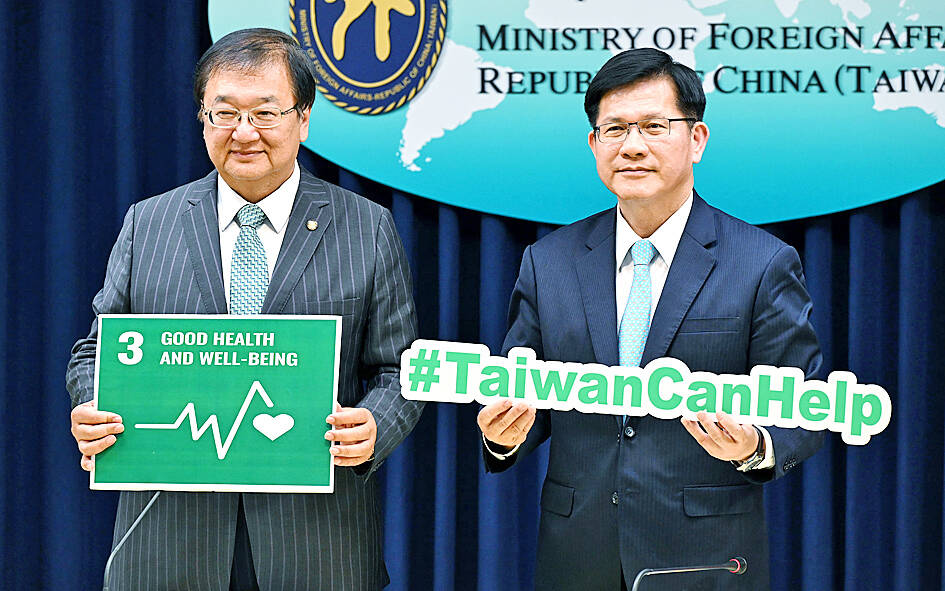Eight countries issued a joint statement yesterday advocating for Taiwan’s participation in the World Health Assembly (WHA).
The US, Australia, the UK, Canada, the Czech Republic, Germany, Japan and Lithuania’s offices in Taiwan issued a statement “to reaffirm our support for Taiwan’s meaningful participation in the work of the World Health Organization and Taiwan’s participation as an observer in the World Health Assembly.”
“Taiwan remains largely excluded from the world’s international health system,” including not being invited to the WHA, which is to take place from Monday to Saturday next week in Geneva, Switzerland, the statement said.

Photo: Chang Chia-ming, Taipei Times
The eight countries urged the WHO to invite Taiwan, which would be in line with the organization’s commitment to a “health for all” approach to international health cooperation, it said.
Excluding Taiwan “is unjustified and undermines inclusive global public health cooperation and security,” it said.
Taiwan, which participated in the WHA as an observer from 2009 to 2016, is “a highly capable, engaged and responsible member of the global health community,” it said.
The nation’s “significant public health expertise, democratic governance and advanced technology” could contribute greatly to the global health forum, it said.
Meanwhile, Taiwan last night sent a delegation to Geneva to join the sidelines of the WHA, Minister of Health and Welfare Chiu Tai-yuan (邱泰源) said yesterday, adding that excluding the nation from the event is unfair to Taiwanese and a loss to the world.
The Ministry of Health and Welfare is to work with the Ministry of Foreign Affairs until the last moment, Chiu told a news conference in Taipei.
“Health is a fundamental human right and a universal value,” he said.
He is to lead the “WHA Action Team” to Geneva to show Taiwan’s contribution to global health and medicine, including sharing the nation’s expertise in the field at an international news conference, Chiu said.
The team is also to hold bilateral meetings with its counterparts, participate in activities on the sidelines and organize forums, he said.
The team would consider sending a letter of protest to the WHA if the actions advocating for Taiwan’s inclusion fail, he said.
Minister of Foreign Affairs Lin Chia-lung (林佳龍) thanked the nearly 70 countries that have voiced support for Taiwan’s inclusion in the WHA this year, including 11 diplomatic allies that sent letters to WHO Director-General Tedros Adhanom Ghebreyesus on the matter.
Taiwan’s bid to join the WHO as an observer is in line with universal values and should not be undermined by political reasons, Lin said.
Beijing’s attempts to block Taiwan from participating in the WHO are detrimental to all, he said, calling on the organization to resist Chinese pressure and manipulation, and to stay true to its objective of health for all.
Deputy Legislative Speaker Johnny Chiang (江啟臣) is to lead a separate group of legislators to Geneva, Chiu said.

Taiwan is projected to lose a working-age population of about 6.67 million people in two waves of retirement in the coming years, as the nation confronts accelerating demographic decline and a shortage of younger workers to take their place, the Ministry of the Interior said. Taiwan experienced its largest baby boom between 1958 and 1966, when the population grew by 3.78 million, followed by a second surge of 2.89 million between 1976 and 1982, ministry data showed. In 2023, the first of those baby boom generations — those born in the late 1950s and early 1960s — began to enter retirement, triggering

ECONOMIC BOOST: Should the more than 23 million people eligible for the NT$10,000 handouts spend them the same way as in 2023, GDP could rise 0.5 percent, an official said Universal cash handouts of NT$10,000 (US$330) are to be disbursed late next month at the earliest — including to permanent residents and foreign residents married to Taiwanese — pending legislative approval, the Ministry of Finance said yesterday. The Executive Yuan yesterday approved the Special Act for Strengthening Economic, Social and National Security Resilience in Response to International Circumstances (因應國際情勢強化經濟社會及民生國安韌性特別條例). The NT$550 billion special budget includes NT$236 billion for the cash handouts, plus an additional NT$20 billion set aside as reserve funds, expected to be used to support industries. Handouts might begin one month after the bill is promulgated and would be completed within

The National Development Council (NDC) yesterday unveiled details of new regulations that ease restrictions on foreigners working or living in Taiwan, as part of a bid to attract skilled workers from abroad. The regulations, which could go into effect in the first quarter of next year, stem from amendments to the Act for the Recruitment and Employment of Foreign Professionals (外國專業人才延攬及僱用法) passed by lawmakers on Aug. 29. Students categorized as “overseas compatriots” would be allowed to stay and work in Taiwan in the two years after their graduation without obtaining additional permits, doing away with the evaluation process that is currently required,

IMPORTANT BACKER: China seeks to expel US influence from the Indo-Pacific region and supplant Washington as the global leader, MAC Minister Chiu Chui-cheng said China is preparing for war to seize Taiwan, Mainland Affairs Council (MAC) Minister Chiu Chui-cheng (邱垂正) said in Washington on Friday, warning that Taiwan’s fall would trigger a regional “domino effect” endangering US security. In a speech titled “Maintaining the Peaceful and Stable Status Quo Across the Taiwan Strait is in Line with the Shared Interests of Taiwan and the United States,” Chiu said Taiwan’s strategic importance is “closely tied” to US interests. Geopolitically, Taiwan sits in a “core position” in the first island chain — an arc stretching from Japan, through Taiwan and the Philippines, to Borneo, which is shared by